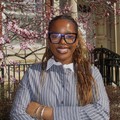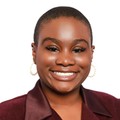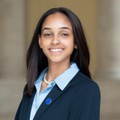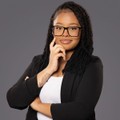Growing up in Northeast Portland, Oregon, I was surrounded by people who looked like me, yet very few of us had seen examples of success outside the usual paths. In my neighborhood, dreams often stopped at “making it out,” but no one quite knew what “out” looked like. Many of my peers either stayed in Oregon to attend the same universities as generations before them or chose work that felt safe and familiar. Some gave up on the system entirely, believing success wasn't made for people like us.
But I believe economic empowerment and business innovation can be the blueprint for rewriting that story—for changing the trajectory of underrepresented communities like mine. Real, lasting change starts with exposure, opportunity, and the creation of systems that work for us, not against us. That’s the foundation of my vision.
My career goals are deeply rooted in both creativity and justice. As a Marketing major and Film and TV minor at Howard University—an HBCU that changed my life—I’ve found my purpose in storytelling and entrepreneurship. I’m building Shelmor Productions, my future media company, not just to create content but to build infrastructure. I plan to use Shelmor as a vehicle for job creation, mentorship, education, and generational wealth, especially in underserved Black communities.
Economic empowerment means giving people the tools and access they’ve been historically denied. Through Shelmor, I want to invest in local schools, offer scholarships to students who may not have perfect grades but have powerful potential, and fund arts programs that allow youth to explore creativity. Business innovation means using nontraditional methods—like media, digital storytelling, and community-based initiatives—to foster connection, educate, and inspire. I want to host hometown film festivals, partner with schools on creative career pipelines, and create internship opportunities that pay and prepare.
My vision is not just about giving back, but about building up. I believe true social equity happens when people don’t just receive help—they receive ownership, opportunity, and the chance to become leaders in their own right. I want the next generation of Black and Brown creatives to know they don’t have to leave their culture behind to be successful. They can bring their full selves into the room and lead.
This drive comes from my own story. In 2020, during the pandemic, my mom, sister, and I were homeless. We didn’t know what would happen next. But during that time, strangers and organizations offered food, service, and support. It wasn’t just survival—it was love in action. That experience taught me what it feels like to be helped and reminded me of the importance of helping others when I reach a position of power. I don't take that responsibility lightly.
In a world where systemic barriers have held too many of us back for too long, I’m determined to be part of the solution. My career in business is not about wealth for its own sake—it’s about worth, willingness, and widening the path for those who come after me. With every story Shelmor tells and every dollar it makes, I want it to echo one truth: we are worthy, we are powerful, and we can change the world—starting with our own communities.
As a proud Executive MBA candidate at Prairie View A&M University, a historically Black institution rooted in excellence and legacy, I am inspired daily to think critically about how business can serve as a tool for social equity. Economic empowerment and business innovation are not just professional interests, they are my personal missions. I believe both are essential to uplifting underrepresented communities and driving systemic change that lasts.
Growing up in Crockett, Texas, a small, rural town often overlooked in conversations about opportunity, I witnessed firsthand how limited access to resources and economic infrastructure can hinder even the most talented individuals. Yet, I also saw resilience, creativity, and untapped potential. These early experiences shaped my belief that business leaders have a duty to create pathways for those who’ve historically been excluded.
Through my 15+ years in management and now in my current role as a Budget Specialist II, I’ve come to understand how vital financial literacy and equitable economic policy are to building generational wealth. Business innovation can be a transformative force: whether by designing inclusive financial tools, promoting supplier diversity, or launching community-led initiatives that support entrepreneurship. When underrepresented voices are brought to the table—not as tokens, but as decision-makers—real transformation happens.
My career goals reflect my desire to be that decision-maker. I aim to become a Comptroller and, ultimately, a Director or Vice President in finance or business operations. These positions offer the influence and reach to shape organizational culture and investment in ways that promote equity. I want to lead initiatives that reinvest in communities like mine—supporting small businesses, enhancing financial access, and mentoring emerging leaders from underrepresented backgrounds.
My time as a student-athlete at Jarvis Christian University taught me the value of discipline, strategic thinking, and leading by example. Academically, I was a Dean’s List recipient, and in my community work with the Groves Educational Foundation, I’ve seen how targeted outreach can inspire youth and support families. These experiences, coupled with the holistic and culturally affirming education I’m receiving at PVAMU, continue to reinforce my belief that business education—especially at an HBCU—can be a powerful engine for justice.
An HBCU business scholarship would not only help support my academic journey, but also deepen my commitment to this vision. It would be a tangible investment in someone determined to give back through strategic leadership and socially responsible innovation. I am committed to using my skills to break down barriers, build bridges, and help ensure that future generations inherit more opportunities than the last.
I don’t see business and social justice as separate paths—they are the same road. And I plan to walk it with purpose.
Being born and raised in South Los Angeles, in the Crenshaw/Leimert Park district, I witnessed what it looks like to live in an underrepresented community. We have spirit, culture, and pride, but we don’t have the resources that other areas take for granted. The basic things you need, such as quality grocery stores, banks, and places to shop locally, were closed down one after another to the point that there aren’t many left, and the once-vibrant Crenshaw Mall is now an empty shell of what it once was. That reality shaped how I viewed the world — and it’s part of what drives me today.
My parents were fair when it came to giving me things. Once I was in middle school, they made me earn what I wanted, for example, a new pair of sneakers, video games, or money to go out. Whether it was mowing lawns, washing cars, or running errands for neighbors, I had to figure out how to earn what I wanted. I didn’t know what to make of it at the time. But as I grew older, I saw that those lessons prepared me for something bigger. I wasn’t just learning the value of money but also how to be independent. COVID-19 hit, and life for people slowed down — but my ambition didn’t. As many people were sitting at home wondering what to do, I saw it as an opportunity to build something. I started an online business selling custom shoes I’d hand-paint and accessories I made with a cheap 3D printer I found on Amazon. I taught myself how to design, market on social media, and handle customer orders. It started small, but I soon made consistent sales and ran every part of the operation independently. That business became more than just a hustle—it became proof that I could take control of my future.
That experience taught me that business isn’t necessarily about profit but empowerment. Having a little source of income gave me confidence, options, and freedom. It also had me thinking about all the other young people like me in the neighborhood who may have ideas but not the support or resources to help them bring those ideas to fruition.” Now, as a student at Howard University, I find myself surrounded by people who share that same hunger for success and desire to lift our communities. Attending an HBCU has opened my eyes further to the importance of representation and why economic equity is essential.
I want to use my education to create spaces for entrepreneurs in underrepresented communities like Crenshaw and Leimert Park. My long-term vision is to host events at Leimert Park so people can show off their businesses/products and open a business incubator that gives young Black entrepreneurs the resources, guidance, and capital they need to make their ideas become financially sustainable businesses. Our economic empowerment begins in our homes, neighborhoods, and communities. It means teaching people they don’t have to wait for something to be given to them — they can make their own path. This scholarship is more than just financial assistance—it is an investment in someone who has experienced the struggle firsthand and is determined to be a part of the solution.
My grandmother used to keep cash hidden inside books. She didn’t trust banks—not because she lacked financial sense, but because the system had failed her. Growing up in Newark, New Jersey, she experienced redlining firsthand, and after being denied a mortgage for years despite consistent income, she gave up. Instead of interest-bearing accounts or investment portfolios, she relied on cash and caution. This fear is a response shaped by generations of economic betrayal. From the Freedman’s Savings Bank collapse in 1874, which cost formerly enslaved people their first savings, to predatory lending and discriminatory banking practices, Black Americans have long been given reason to be wary. As a child, I never questioned it. As a young Black woman studying accounting at North Carolina A&T, I realize now how deep the damage runs when wealth-building tools are withheld from entire communities.
Generational wealth has long been denied to Black families through discriminatory practices in housing, education, and banking. Today, only 45% of Black Americans own homes compared to 74% of white Americans, according to the U.S. Census Bureau (2022). The gap in homeownership alone costs Black communities billions in lost intergenerational equity. And despite rising college attendance, Black students are still the most likely to borrow, and borrow more, for higher education (Brookings, 2016). This is more than statistics, its a lived reality.
My vision for economic empowerment is rooted in reclaiming access and rewriting systems. So we can enter boardrooms and transform what they value. I plan to become a Certified Public Accountant (CPA), eventually opening a firm that focuses on empowering underserved communities through financial education, tax strategy, and small business development. My goal is to create pathways for families like mine to not only survive, but build, own, and lead.
However, policy must also meet people where they are. Through coursework, internships, and my mentoring experience with high school students in Guilford County, I’ve learned the power of pairing business insight with community context. One solution I advocate for is embedding community-based financial literacy programs within public schools and youth centers, especially in redlined neighborhoods. According to the National Endowment for Financial Education, 88% of U.S. adults say high school did not prepare them to manage money. Teaching budgeting, credit building, and entrepreneurship early can reshape futures.
At the same time, I want to work with HBCUs and local governments to establish “tax equity clinics”- spaces where low-income earners can receive pro bono tax help and learn how to leverage returns toward investment. In 2021, over 20% of eligible families failed to claim the Earned Income Tax Credit (IRS), often due to misinformation or fear. With the right guidance, those refunds can go toward student debt, homeownership, or starting a business. This is how I plan to drive innovation, through systems that work for those who’ve been left out of the equation.
I carry my grandmother’s story with me—her strength, her losses, her resilience. When I enter a meeting or mentor a student, I remember the day I found $300 folded into the pages of a cookbook she gave me. “That’s your college fund,” she said. She didn’t get to see me walk across the stage, but every number I crunch, every policy I write, and every person I serve will be because of her. Economic justice doesn’t begin with wealth, it begins with access. I’m committed to opening that door for others, one spreadsheet, one student and one strategy at a time.
My upbringing in Alief taught me early on that access determines one’s potential. My peers who possessed both great ideas and talent faced uphill battles because we lacked essential resources, mentorship, and exposure rather than a lack of drive. The early understanding I gained ignited my desire to connect creative potential with available opportunities.
While studying at Texas Southern University’s Jesse H. Jones School of Business, I have discovered a community of peers who are constantly generating new ideas. Despite our community's abundant talent pool, many of us encounter systemic obstacles that create unnecessary difficulties for upward mobility. That’s why I chose to study business marketing: I study business marketing to understand the construction of brands and how storytelling and market influence work together. I plan to earn a master's degree in fashion marketing so that I can strengthen underrepresented voices by combining fashion with strategic storytelling.
My understanding of leadership deepened while serving as membership chair for the American Marketing Association (AMA) at TSU. The chapter held multiple events during Fall 2025's AMA Week to create connections between students and industry experts and recruiters, as well as other beneficial resources. The guest speaker unexpectedly canceled their presentation at the last minute. The students had placed their trust in this opportunity. In just one hour we found a replacement speaker because I rapidly connected with our advisor and local contacts. The event didn’t just happen—it had impact. Leadership extends beyond planning because it requires maintaining composure under pressure and ensuring others gain meaningful insights.
Being part of Sigma Gamma Rho Sorority, Inc. keeps me aware of the crucial role service plays alongside sisterhood, scholarship, and service. I continue to champion empowerment through organizing networking events and mentoring others following the path lit by previous trailblazers.
My drive to create a supportive platform for Black creatives and entrepreneurs stems from these experiences. The space I imagine will deliver workshops on personal branding along with financial literacy, marketing strategy, and storytelling skills while remaining culturally relevant and driven by community needs. This platform will serve as a launchpad and support system that focuses on providing access to tools for people who traditionally lack access to them. I’ve encountered numerous talented individuals who need just one opportunity to make their mark. My mission is to close that gap.
My professional journey goes beyond business—it’s about using strategy and creativity to foster community with care. With this scholarship I will advance my vision into actuality, which will develop opportunities for my personal growth and enable others to succeed.
When I was 14, I helped my mother sell homemade candles at a local flea market in South Dallas. We didn’t call it a “business,” but looking back, that table covered in wax-stained cloth was my first lesson in entrepreneurship. I watched how her creativity and grit turned a small idea into real income, enough to help pay bills when times were tough. That experience opened my eyes to the power of business as a tool not just for profit, but for survival, dignity, and ultimately, transformation.
Today, as a senior business management major at an HBCU, my vision is to create systems that allow stories like my mother’s to become the rule, not the exception. I believe economic empowerment and business innovation are essential for uplifting underrepresented communities, especially Black and brown neighborhoods that have long been excluded from access to capital, quality education, and opportunity.
True economic empowerment begins with education and ownership. Too often, underrepresented communities are kept out of the loop when it comes to financial literacy and entrepreneurial strategy. Through my studies and experiences, I’ve learned how business can be used not just to generate income, but to build community wealth. I envision a future where business accelerators are built within urban schools, where minority owned startups receive real mentorship and funding, and where technology is leveraged to democratize access to markets.
Business innovation also plays a key role in creating lasting change. In a world dominated by automation, artificial intelligence, and e-commerce, underrepresented communities deserve a seat at the table of innovation. I want to help build that table. Whether it’s launching mobile platforms for minority freelancers, investing in sustainable local food systems, or supporting tech education for inner-city youth, my goal is to make innovation accessible, equitable, and community-driven.
My career goal is to become a strategic consultant and eventually an investor focused on social enterprises. I want to help small business owners scale their ventures in ways that create jobs, retain cultural identity, and circulate dollars within their communities. Long-term, I aim to establish a fund that backs minority-led businesses with not just capital, but mentorship and ecosystem support. To me, business is not simply about maximizing shareholder value it’s about maximizing human potential.
This scholarship will help me continue my education, deepen my understanding of ethical leadership, and sharpen the tools I need to serve. As I prepare to graduate and step into the world of business, I carry with me not just textbooks and case studies, but the memory of that flea market table and all it represents.
In the end, economic empowerment is about ownership of businesses, of futures, and of the narratives we write for our communities. Through business innovation, I believe we can build systems that don’t just create wealth, but restore justice. I’m committed to being part of that change.
For as long as I can remember, storytelling has been my passion. But as I grew older, I realized that media isn’t just about telling stories—it’s about shaping culture, creating opportunities, and driving change. Today, as a rising junior at Howard University majoring in Strategic Communications with a concentration in Advertising and a minor in Graphic Design, my vision is to build a career at the intersection of creativity, business, and justice.
Economic empowerment begins with visibility and ownership. Growing up, I rarely saw people who looked like me or shared my experiences represented in the media. That lack of representation wasn’t just disheartening, it was disempowering. Now, I aspire to become a Creative Director and eventually launch my own inclusive media agency, focused on amplifying diverse voices and breaking down barriers that have historically excluded underrepresented communities from leadership and ownership in the media industry.
My vision for business innovation involves more than profit, it centers on people. I want to create campaigns that challenge stereotypes, mentor the next generation of creatives, and reinvest in marginalized communities through education, internships, and workforce development. I founded Project Success, a social media initiative helping students, especially those from underserved backgrounds, define success on their own terms. Through accessible content and storytelling, I've reached hundreds of students, offering them tools, representation, and encouragement.
From founding the Black Student Union in high school to leading as Executive Coordinator of the Howard University Royal Court, I’ve always used leadership to elevate others. I see business as a powerful vehicle for social equity—one that can redistribute opportunity, reimagine systems, and rewrite the narrative for communities that have too long been left out.
By blending creativity with purpose, I hope to lead a business that not only delivers results but also drives systemic change. My career goals are grounded in justice, and every step I take is toward building a more inclusive, empowered future.
By blending creativity with purpose, I hope to lead a business that not only delivers results but also drives systemic change. My career goals are grounded in justice, and every step I take is toward building a more inclusive, empowered future.
Receiving the SCFU Scholarship would be instrumental in helping me continue to achieve my goals. It would ease the financial burden of college and allow me to stay focused on my academics, leadership roles, and creative projects. More importantly, it would bring me one step closer to creating a media landscape where everyone, regardless of background, can see themselves reflected and valued.
Growing up, education was always a primary point of emphasis in my family’s values. This was especially true for my late father, a proud Rattler and member of Omega Psi Phi, who instilled in me a deep appreciation for the transformative power of HBCUs. His belief in HBCUs’ impact on students’ lives shaped my understanding of education as more than just a personal endeavor and more towards finding a community, creating a legacy, and creating opportunities for those who come after us. Thus when I chose to attend Fisk University, it wasn’t only for its rich history; it was because I wanted to be part of something greater.
From my first day, I was surrounded by people who challenged me to step up as a leader. Most notably, this same community played a pivotal role in helping me cope with the death of my father which served as a key turning point in my life during my freshman year. Before I knew it a year had passed and I found myself honoring his legacy by joining the Eta Psi Chapter of Omega Psi Phi and serving as President of my chapter of Omega Psi Phi Fraternity while simultaneously directly impacting the campus of Fisk as Student Government Publications Director. Both roles left me with the valuable lesson that it’s not about elevating oneself but lifting others and that leadership is about service and collective growth. This impacted my approach to work and prepared me for future endeavors, including my first few internships and projects.
My first internship with the Los Angeles Lakers was a pivotal experience that reinforced this purpose and clarified how I wanted to make an impact. While working on a social media strategy research project for over 25 professional sports teams, I saw firsthand how teamwork and collective vision lead to impactful results. The Lakers’ emphasis on collaboration showed me that success is built by bringing people together just as in my fraternity and school. This laid the groundwork for my next major collaboration with NASA as an HBCU White House Scholar. Alongside a diverse team, I helped pitch a financial literacy game that aimed to solve youth attention span issues by using NASA’s CBCM technology. Working on this project fueled my passion for leveraging teamwork to create innovative solutions that could directly benefit communities.
Inspired by these experiences, I knew I wanted to make an impact utilizing digital design and business strategy. Thus I founded two businesses, "HBCU Designs" and "The Scholarship Champ," both of which are centered on empowerment and collaboration. Through HBCU Designs, I’ve been able to work closely with students and small businesses, helping them develop strong, lasting brand identities. Our team not only provides services like logos or marketing consultations; we work side-by-side with our clients to ensure their stories are authentically told and their goals achieved. This has profoundly impacted students who might not otherwise have the resources to build their brands.
The Scholarship Champ similarly, focuses on access to education and improvement within the community. With this platform, we intend to help HBCU students find scholarships, and internships, and learn how to secure them. By helping students navigate these opportunities, I’m contributing to their academic and professional growth, which is crucial in leveling the playing field for minority students. All in all my ultimate purpose is to continue building platforms and opportunities that uplift not just individual students but the entire HBCU community as well as honor my late father and the many other mentors that have played a role in my life.
Economic empowerment and business innovation have the potential to make a lasting change in minority communities that are underrepresented. New jobs could be created, opening up more opportunities and building wealth. These two factors have a critical role in decreasing poverty and addressing the systemic barriers that many underrepresented groups face. When a community is economically empowered, it can thrive and be independent.
One of the most significant ways business innovation helps underrepresented communities is through job creation. When people start businesses, they create employment opportunities for others, directly benefiting the local community. One of my career goals is to own and operate my own business. My business will stimulate the local community and economy by increasing employment in my community, as well as fulfilling the needs of my community. This creates a circle of job growth because when more people are employed, more people are earning money, which increases purchasing power and the demand for a business.
On top of creating jobs, new businesses give people the opportunity to learn new skills. Businesses need employees with various abilities in fields such as customer service, technology, or conflict management. By offering professional training and development, businesses help to provide their employees with valuable skills that will eventually help them in their future careers. I worked at Chuck E. Cheese’s for 2 years. There, I learned many beneficial skills, such as conflict resolution, multitasking, and communication. Opportunities like this can be extremely helpful for young people, especially ones who come from communities with limited access to job training and high-quality education.
One of the biggest problems people who plan to start businesses face in marginalized communities is access to funding. Much like college, without funding like loans, grants, or investors, many prospective businesses simply will not come into fruition. Part of economic empowerment is creating easier access to these resources. Business owners with access to these resources have the potential to reinvest the money in their community, improving infrastructure, supporting schools, and combating local issues.
Successful business innovations open up a path for the building of generational wealth, and successful business owners can serve as role models. They can create assets like property or investments that will eventually grow in value over time. These assets can be passed down to future generations, which allows families to build financial security and freedom. When young people see successful business owners that they relate to, whether in race, background, or gender, it can inspire them to pursue their own goals and show them that success is possible for people like themselves. It shows that success is not limited to one particular group of people.
Many successful business owners from marginalized communities often become advocates for policy changes that positively affect the community they come from. The success they earned gives them the ability to have a platform and a louder voice to speak out for changes for the benefit of their community.
Economic empowerment and business innovation are extremely critical components to the uprising of underrepresented communities. They allow people to build wealth and improve the quality of these communities. Successful entrepreneurs give younger people a relatable model to look up to, which in turn helps economic empowerment and business innovations to break down barriers associated with starting a successful business and create a lasting effect on future generations.
As a rising sophomore political science major at Tennessee State University, my vision for economic empowerment and business innovation is rooted in my aspiration to own a law firm that serves as a catalyst for social equity and justice. I believe that a law firm can be more than just a provider of legal services; it can actively contribute to uplifting underrepresented communities. By focusing on civil rights, employment discrimination, and social justice, I aim to use the legal system as a tool to address systemic inequalities and advocate for marginalized groups. My goal is to create a practice that prioritizes access to justice, ensuring that quality legal representation is available to all, regardless of socioeconomic status.
To achieve this vision, I plan to implement initiatives such as a robust pro bono program that offers free or low-cost legal services to underserved communities and community legal education workshops that empower individuals with knowledge about their rights. Additionally, I intend to prioritize diversity in hiring and establish mentorship programs for aspiring lawyers from underrepresented backgrounds, fostering an inclusive environment within the legal field.
Collaborating with local nonprofits and community organizations will further enhance our collective impact, allowing us to address community needs holistically while promoting economic growth.
My current experiences are already shaping my path toward these goals. As a Community Organizer with Rhizome, I am honing my skills in community engagement and youth leadership development, understanding the power of grassroots organizing in creating change. My involvement in Tennessee State's Pre-Law Chapter of Phi Alpha Delta Law Fraternity has provided valuable insights into the legal profession and networking opportunities. Additionally, participating in the Moot Court Team has sharpened my advocacy skills and deepened my commitment to justice. Through these experiences, I strive to empower my peers and create a lasting impact in our communities, aligning my career goals with my desire to drive social equity and justice.
Furthermore, I recognize that economic empowerment extends beyond the courtroom. As a future law firm owner, I plan to implement innovative business practices that not only ensure the firm's success but also contribute to the economic growth of the community. This includes creating job opportunities for local residents, partnering with minority-owned businesses for services, and investing in community development projects. I believe that by demonstrating successful and socially responsible business practices, my firm can serve as a model for other enterprises, encouraging a ripple effect of positive change throughout the community.
My commitment to this vision is further reinforced by my role on the Marketing Team of Tennessee State's Student Trustee Committee. This position has given me insights into organizational leadership and the importance of effective communication in driving change. I plan to leverage these skills in my future law firm to not only advocate for our clients but also to amplify the voices of underrepresented communities in broader social and policy discussions. By combining legal expertise with strategic communication and community engagement, I believe we can create a powerful platform for systemic change and economic empowerment.
























